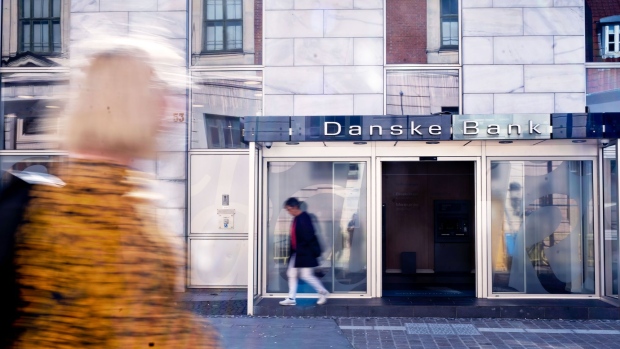Jul 23, 2021
Danske CEO Says Retail Business Still Hampered by Image Issues
, Bloomberg News

(Bloomberg) -- The chief executive of Danske Bank A/S says growth in the lender’s retail business remains clouded by a history of financial scandals that are still weighing on customer sentiment.
The comments by Carsten Egeriis, who became CEO in April after his predecessor stepped down due to a money laundering probe, were made during a conference call on Friday morning. He spoke after the bank published quarterly results that contained few surprises after Danske raised its guidance earlier this month.
Egeriis used the conference call to spell out risks facing the bank. He also raised doubts around the timing of when Danske might start paying out excess capital to shareholders.
Shares in Denmark’s biggest bank fell as much as 5% when trading started in Copenhagen, sending it to the bottom of the Bloomberg index of European financial stocks.
In its quarterly report, Danske delivered a more upbeat message, revealing it’s built up ample cash reserves and is ready to start distributing the money to shareholders as soon as it can.
The lender “has strong capital and liquidity positions,” it said. The board is “closely” monitoring the situation “and remains committed to returning excess capital to shareholders when the economic impact of the corona crisis is clear.”
Danske now has a common equity Tier 1 ratio -- a key measure of financial strength -- of 18%, exceeding its target of more than 16%. The bank said its dividend policy, which was shelved during the pandemic, will kick in again after regulators give the all-clear. The bank has told shareholders to expect between 40-60% of profits.
Danske is the last of the big Nordic banks to report second-quarter results, with economic rebounds buoying profits across the region and allowing boards to signal that shareholder rewards will resume soon.
The European Central Bank has signaled it will expect the industry to show restraint even after a de facto ban is removed later this year. But with Nordic economies bouncing back faster than the euro zone on average, there’s reason to expect financial watchdogs in the region might take a less stringent approach than the ECB.
Danske has spent the past three years trying to resurrect its image after a series of scandals. Egeriis, who succeeded Chris Vogelzang as CEO, after the latter stepped down in connection with a money-laundering probe at ABN Amro Bank NV, says Danske is now benefiting from a faster economic recovery than anticipated.
That allowed it to raise its full-year guidance earlier this month, and Danske now sees profit exceeding 12 billion kroner ($1.9 billion) for all of 2021, compared with a previous forecast for 9 billion kroner to 11 billion kroner.
But costs remain a focus. Danske has invested heavily in building iron-clad defenses against money laundering. That’s amid ongoing investigations in the U.S. and Europe after Danske’s 2018 admission that it failed to screen 200 billion euros ($235 billion) that flowed through a now shuttered Estonian unit.
Egeriis said during the conference call that Danske will need to wait for the Estonian investigations to be resolved before it can distribute excess cash to shareholders.
Key Figures...
- Danske repeated its target for a return on equity of 9-10% in 2023, less than the 15% some of its Nordic peers expect to achieve.
- Net income reached 2.79 billion kroner.
- The common equity Tier 1 ratio was 18%.
- Net fee income reached 3.19 billion kroner, up 18% from a year earlier.
©2021 Bloomberg L.P.